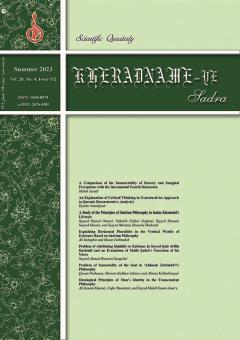An Explanation of Critical Thinking in Constructivist Approach (a Qur’ānic Deconstructive Analysis)
Subject Areas : Studies on Islamic philosophy and wisdom
1 - Assistant Professor, Educational Science Department, Payame Noor University, Tehran, Iran
Keywords: critical thinking, deconstruction, Qur’ān, revelation, creative knowledge, constructivism, education,
Abstract :
Theories of critical thinking are generally divided into two groups: theories that describe the positive and negative characteristics of various phenomena, such as human beings, and the Qur’ānic theory indicating that critical thinking should be based on believing in the open, creative, and infinite knowledge of God. Challenging the content of the first approach paves the way for introducing the creative and variable approach to knowledge. In this way, education adopts a religious and unlimited nature more than ever before. The non-restrictive aspect dominates knowledge and, as a result, the content of educational courses based on critical thinking and is developed under the influence of other dimensions of a philosophical system, including values and knowledge. The open and unlimited process of Qur’ānic critical thinking leads to the priority of creative approaches and their effective incorporation into education. The present study aims to explain a kind of critical thinking based on a constructive approach to the open and unlimited Qur’ānic critical knowledge. Deconstruction means analyzing and reviewing each subject through decentralizing it and discovering some of its new other dimensions that are usually neglected.
قرآن کریم (1388) ترجمۀ ناصر مکارم شیرازی، تهران: دفتر مطالعات تاریخ و معارف اسلامی.
ایزدپناه، امین؛ شمشیری، بابک (1399) «بازسازی نقش و کارکرد فلسفه تعلیم و تربیت در نسبت با عمل تربیتی مبتنی بر اندیشههای جان دیویی»، آموزشپژوهی، شمارۀ ۲۴، ص66ـ45.
باقری، خسرو (1389) هویت علم دینی، تهران: پژوهشگاه مطالعات فرهنگی و اجتماعی.
باقری، خسرو (1399) رویکردها و روشهای پژوهش در فلسفه تعلیم و تربیت، تهران: پژوهشگاه مطالعات فرهنگی و اجتماعی.
تمیمی آمدی، عبدالواحد بنمحمد (1380) غرر الحکم و درر الکلم، ترجمۀ محمد انصاری، تهران: امام عصر.
شیخه، رضا و همکاران (1397) «تبیین دوران کودکی در رویکرد برساخت گرایی اجتماعی (تحلیل واسازانه درباره دوران کودکی)»، دوفصلنامه فلسفه تربیت، شمارۀ 4، ص56ـ25.
طباطبایی، سیدمحمدحسین (1374) تفسیر المیزان، ترجمه محمدباقر موسوی همدانی، قم: دفتر انتشارات اسلامی.
طیبی ابوالحسنی، سیدحسین (1398) «درآمدی بر روش تحقیق: رویههای استاندارد تحلیل دادههای کیفی»، سیاستنامه علم و فنآوری، شمارۀ 27، ص95ـ67.
عطاالله، محسن؛ موسوی، سیدرسول (1396) «مفهومشناسی ریب در قرآن و روایات اهل بیت (ع)»، نشریه تفسیر اهل بیت (ع)، شمارۀ 5، ص122ـ 105.
غزالی، محمدبنمحمد (1374) میزان العمل (ترازوی کردار)، ترجمه علیاکبر کسمایی، تهران: سروش.
کلینی، محمد بن یعقوب (1343) اصول کافی، ترجمۀ صادق حسنزاده، تهران: اطلاعات.
محمدپور، احمد (1396) روش تحقیق معاصر در علوم انسانی (مباحث در سیاستهای روش)، تهران: ققنوس.
مصلح، علیاصغر؛ پارسا خانقاه، مهدی (1392) «خاستگاههای واسازی نیچه»، متافیزیک، شمارۀ 16، ص114ـ93.
معلوف، لویس (1384) المنجد، ج2، ترجمۀ محمد بندرریگی، تهران: ایران.
نیچه، فریدریش (1384) انسانی، زیاده انسانی، ترجمه ابوتراب سهراب، تهران: نشر مرکز.
واربرتون، نایجل (1388) بنیانهای فلسفه، ترجمۀ علی حقی، تهران: اهل قلم.
Bianca L. & Wolbers, M. H. J. (2020). Critical thinking, creativity and study results as predictors of selection for and successful completion of excellence programs in Dutch higher education institutions, European Journal of Higher Education, VOL. 11, NO. 1, pp.29–43; https://doi.org/10.1080/21568235.2020.1850310
Carr, A. (2016). Positive psychology the science of happiness and human strengths. New York: Brunner-Routledge.
Derrida, J. (1967). L’Ecriture et la Difference. Aux Éditions. Du Seuil.
Derrida, J. (1982). Margins of philosophy, trans. Alian Bass. The harvester Press.
Derrida, J. (1987). Limited Inc. Evanston: Northwestern University Press.
Emir, S. (2009). Education faculty students’ critical thinking disposition according to academic achievement. Procedia Social and Behavioral Science, Vol. 1, No. 1, pp.2466-2469.
McCormick, J. P. (2001). Derrida on Law; Or, Poststructuralism Gets Serious. Political Theory, Vol. 29, No. 3, pp. 395-423.
Higgs, P. (2002). Deconstruction and Re-Thinking education. South African Journal of Education, Vol. 22, No. 3, pp. 170-176.
Kelly, D. W. (2018). Assemblage Thinking. Encyclopedia of Global Archaeology. ed. C. Smith. Springer.
Stapleton, P (2011). A survey of attitudes towards critical thinking among Hong Kong secondary school teachers: Implications for policy change. Think Skills Creat., Vol. 6, No. 1, pp.14-23.
Weilian, Ma. (2020). Cultivation of Critical Thinking Skills in the Course of Readings from British and American Press. Creative Education, Vol.11, No. 8, pp.1351-1356.
Yin, X. F. (2004). A Study on Innovative Textual Reading: A Teaching Pattern and Its Significance. Foreign Languages in China, No. 1, pp.41-45

